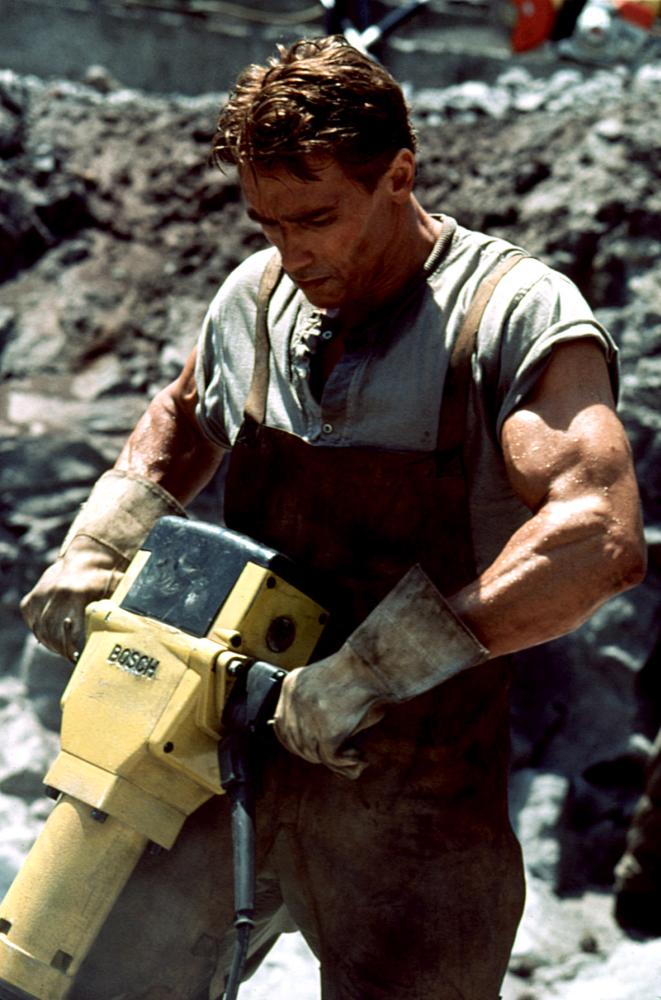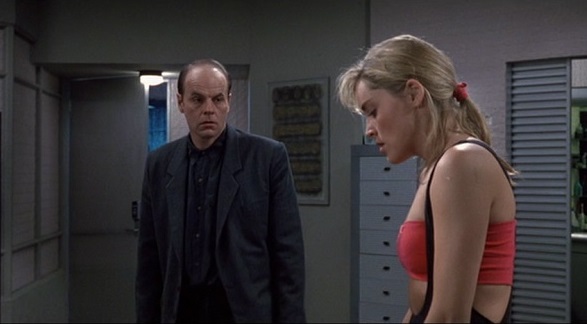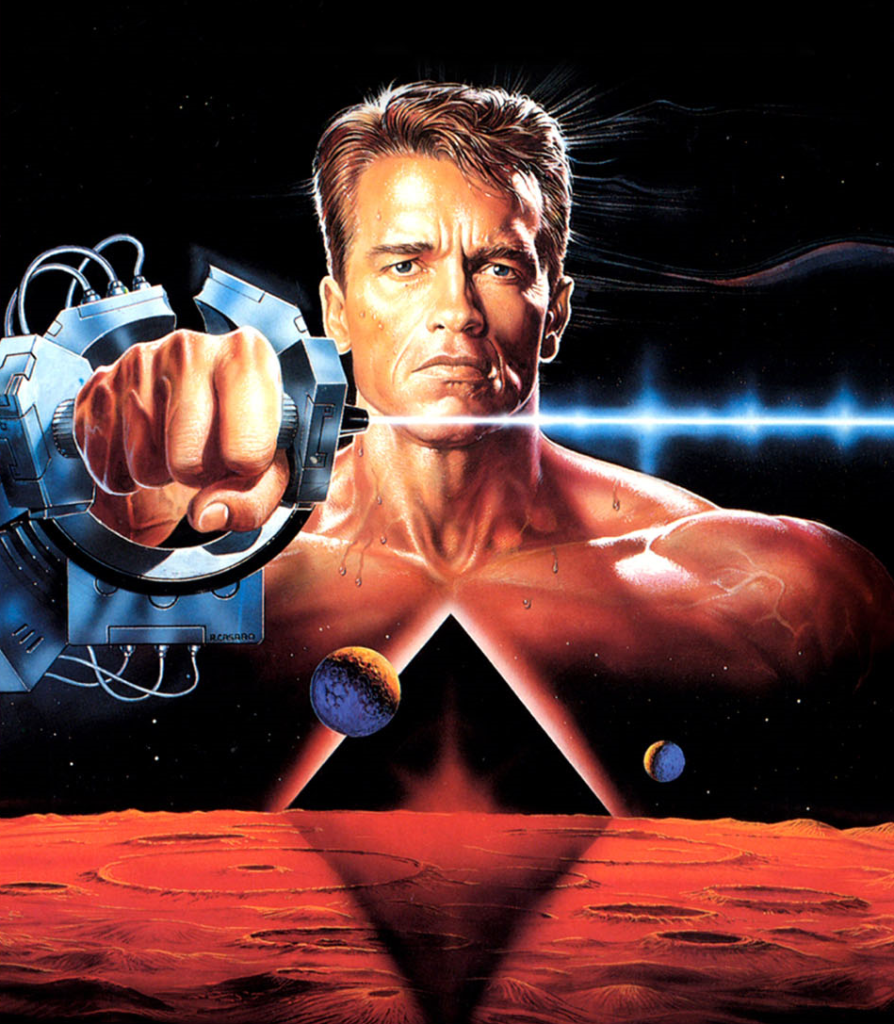
Preface: HOLY SHIT, ARNOLD IS 70 YEARS OLD
Few actors have supplied my brain with more good times and positive memories than Arnold Alois Schwarzenegger. I love the charming bastard. And, in honor of his recent record breaking completion of 6 consecutive decades spent kicking ass I’ve chosen to write up* a little piece celebrating my favorite “Arnie-Flick”. No, it isn’t The Terminator. That’s my favorite movie featuring Arnold Schwarzenegger. Nor is it The Running Man; Arnold’s most batshit unchained movie. No again to Predator, the most macho and badass film in his stock. The most overlooked, and underrated gem, Raw Deal, perhaps? Nope. It isn’t even his best overall, the cinematic masterpiece that is Conan The Barbarian. And, while Commando could give my pick a gun for it’s money (he shoulders-around a freshly chopped down tree, feeds a deer ice cream with a little girl, and shoots a guy in the forehead all within the first few minutes of screentime), in my heart-of-hearts, my favorite is the Paul Verhoeven-helmed, seminal sci-fi schlock-fest: Total Recall.

REMEMBERING TOTAL RECALL
An essay by Ty H.
Set in the near-enough future, Total Recall tells the story of Douglas Quaid; your average 1980’s Arnold Schwarzenegger-esq, blue-collar success story-type. When Doug isn’t demolishing concrete with power tools, he spends his time sexually pleasing his wife Lori – a 1980’s Sharon Stone-esq videogame, exercise and yoga pants enthusiast-type – and being listlessly godlike in his New-Wave apartment with his 1,000-inch flat screen TV. But, despite being the definitive example of successfully applying hard-work and baby-oil to fabulous genetics, Doug literally dreams of more.
The future is not what was promised to me as a 7 year-old.

Bored with being awesome, Quaid has recurring fantasies about engaging in forbidden romance and horrific death on the planet of Mars; ‘cuz, having already crushed it on Earth, what else does he have left to do there?
One day, after seeing a commercial by Rekall (the artificial-vacation-memory-
I fucking love Total Recall.

For the same reasons you do: it’s fast-paced, over-the-top, innovative, quotable, memorably acted, beautifully designed; deftly edited; it features a catchy score and dozens of brilliant acts of violence; all of it accentuated with special effects that pull off a three-breasted woman, a deformed baby-man growing out of another man’s diaphragm, and a guy pulling a chunk of plastic out of his nose the size of a hen’s egg. And, that’s just naming a couple favorites.
However…
While it’s easy to agree that Total Recall is one of the greatest science-fiction movies ever made, there is one thing that divides those that have seen it — I call us “fans” — from unified agreement in our praise: the ambiguous fate of one Douglas Quaid and whether he got his ass to Mars, or got his ass lobotomized on Earth.
Most of us (including the director-extraordinaire himself) tend to subscribe to the latter option for reasons, I admit, appear easier to swallow than the spoonful of salt necessary to believe that (among other things) Mars could be given a working atmosphere over the course of 5 minutes by melting a shit-ton of underground ice with giant glowing LEGOs — But, fuck all that. I personally believe it all went down.
Here’s why:
Wait. I understand that for cinematic and entertainment reasons, many of my henceforth rhetorical questions have clear and obvious answers, so rather than continually address them, just know that my inquires are approached from within the perspective of the film’s context.
OK, now here’s why:
1. Douglas Quaid is jacked.

Guys who look like Quaid have motivation for doing so, and Quaid isn’t given enough. Sure, he seems to eat well, has an athletic partner and yes, he works construction; but the chances of a sensible diet, couple’s virtual tennis, and absorbing jackhammer shockwaves bringing about such glorious muscular definition without even a mention of a background in bodybuilding is… Well, it’s a small point and not really worth arguing. Hence this being first on the list.
However, I bring it up as I think most fans would agree that Quaid’s alter-ego Hauser — an undercover spy working to bring about a violent end to not only a resistance, but an entire culture of people — certainly has reason, if not motivation, to be intimidatingly fit.
2. Quiad’s POV is not Quaid’s it’s… A lot of people’s.

I believe most fans would agree, the last moment of unquestionable, contextual reality is when Douglas Quaid is sedated at Rekall. Now, from this point on if you choose to believe he’s ego-tripping in a Moebius Chair, or even lying catatonic on an adjustable bed with plastic sheets, ask yourself this: Why would Quaid be privy to another character’s point-of-view?
You could say it’s all a dream, as in dreams you can see countless POV changes. Though I would argue (at least from my own limited experience) that when shifting perspectives in dreams, everything starts to break down and very little ends up adding to any cognitive narrative.
“Just like Total Recall?”, you say with a grin?
No, it’s the opposite. And, fuck you, you cynical prick.
Look, the story may be bonkers, but the narrative is always clear and structured, so if what we’re meant to be experiencing is a dream, why doesn’t Quaid remember his perspective changes and “recall” Richter, Lori, Benny, or Cohaagen for the bastards they are?
To extrapolate…
3. The Lori “Love” Triangle

Designed to give Richter personal motivation to pursue Quaid, this subplot is most interesting in that it is purely for the audience’s benefit; because Quaid is oblivious to the whole affair.
It just doesn’t come up. And yet, it exists because – well – because so does everything else.
Now, I know I said I was going to try keep the argument in-context, but I’m pointing this out because if you believe our hero is manifesting everything after the visit to Rekall, and Richter first shows up after said visit to Rekall, you must accept that Doug created Richter and, subsequently, Richter’s relationship to Lori.
Following this logic: why would Quaid even question if Lori were duping him in the hotel room on Mars, as he’s already visualized her getting cozy with the psycho he himself created to keep his plot moving forward? You’d think he’d just “file for divorce” right then and there — but he doesn’t. He’s unsure. Quaid almost (literally) swallows the good Dr. Edgemar’s rouse, but for that droplet of sweat.
And look, even if Quaid is subconsciously blocking the events in which he is not present (for whatever plot-convenient rebuttal) I have to believe that with so much hanging in the balance Rekall would have a better plan for preventing scandal than projecting an Edgemar-avatar into their customer’s psychosis to rationalize their dream-state’s plot-holes with snide witticisms and smug, life-threatening ultimatums.
4. Rekall’s company standards.

It’s one morally-questionable service to offer realistic memory implants of adultery and murder, but to specifically design or allow scenarios in which the client’s real life partner is/or can be portrayed as an undercover assassin, begrudgingly tasked with keeping them compliant through sexual dissolution is unquestionably reprehensible. While you could argue that killing one’s significant other is a fantasy shared by enough consumers to be conceived of as an option for an ‘Ego Trip’ package (unethical and disturbing as that is), why would Rekall want to cater to such damaged individuals?
What’s even worse is if this feature isn’t intentional, as it means it’s just one of countless horrifying possibilities left for the subconscious minds of their thrill-seeking clientele to recall at random and throw into play.
You ever have a dirty or disturbing thought you soon after regretted, but every once and awhile the memory of it drifts in and reminds you of that dark place and time? Now think about that inadvertently becoming a crucial “plot-point” during your Saturn Cruise. Or, what happens when a customer murders someone close to them like Doug does, but then they wake up to find the loved one they killed in battle waiting for them in the lobby to drive them home? My point being, I don’t think “a measly 300 extra credits” would be enough to cover the overhead of a top-level law team they would need to have on full retainer.
Which brings me back to Quaid’s freakout… Directly after he is (finally) knocked unconscious at Rekall, head programmer Dr. Lull clearly states that no memories have been implanted, suggesting as she says, “He’s really been there” (to Mars). Taken at face value, this scene strengthens my argument that everything is real. However, if you believe this scene is just all part of the lobotomy-package (which it would be at this point, as Quaid is comatose), why would it be in his delusion at all — to remind him to hate Rekall when his diet changes to baby-food?
Or, from another perspective, if these memories are intentional, or guided, and all just part and parcel with the trip, why would Rekall be in the habit of making, or allowing the company itself to be part of the “Secret Agent Package” at all, let-alone with memories of their time spent at the facility being ripped-off, dehumanized, experimented on, and then left for brain-dead in a fucking annoying Johnny-Cab? Seems to me that would affect repeat business. No, I think it’s far more likely that Quaid’s sedation-tolerant freakout was something else all-together…
5. The ‘Blue Sky’ Argument

“Blue Sky on Mars”, the name of Quaid’s chosen memory scenario, is just that: a scenario pieced together by Dr. Lull from Quaid’s preferential responses and culled subconscious desires. The only mention of its filename by the amused technician is preceded by the exclamation “that’s a new one”, which I believe backs the following proposal up:
What if the ‘Blue Sky’ scenario is really the subconscious desires of Hauser, in which he’s back on Mars and righted the wrongs he set in motion 6 months prior to “becoming” Douglas Quaid?
And here is where I go-into obsessive theory overdrive:
I see Hauser’s subconscious as either being filled with guilt for betraying the resistance, or (at the very least) tweaked with enough empathy brought-on by his faux-relationship with Melina and months spent fighting for the resistance, that his motivation has switched from a lust to rule Mars with pal Cohaagen, to a desire for atonement and honor. The first scene in the movie with Quaid’s dream of Mars, Melina, and an excruciating death reflects this. Quaid will not allow himself a literal dream of peace on Mars without a blue sky. A blue sky his subconscious ego, Hauser, knows how to achieve, but refuses to allow out of greed. So, Hauser has to go, and this is the last time Quaid channels him.
Afterward, look how he, as Quaid, deals with everyday people. Sure, he’s back to being a killing machine and bad shit happens when he comes around, but Doug’s thoughtful, protective, and kind traits keep shining through; he indulges a beggar child, over-tips a real-life annoying cabbie, and thanks a guy who he beefed with earlier for holding a door open later on.
Quiad’s a decent guy, and he’s in control, fancy parties and blondes be damned.
6. If I have a point, I guess it’s this…

I don’t think a man suffering psychosis from a schizoid embolism would be capable of coherently building the multiple sub-plots and hundreds of minute details that form Quaid’s total recall. Oddly enough, his story makes too much sense for it. And, while many contrivances must be forgiven and coincidences overlooked to accept the story at face-value, I do.
On top of the reasons listed above, I find the interpretations that leave Quaid either in a high-back chair, or waking back to a compromised life with a high-maintenance wife he (at least subconsciously) dreams of shooting in the head, are just far too depressing as endings for a movie that features Schwarzenegger – in drag – killing a group of soldiers with an exploding animatronic head of an obese middle-aged woman.
That’s how I see it, anyways.
*rewrite and repurpose an unfinished, unpublished article I started a year-or-so-ago…